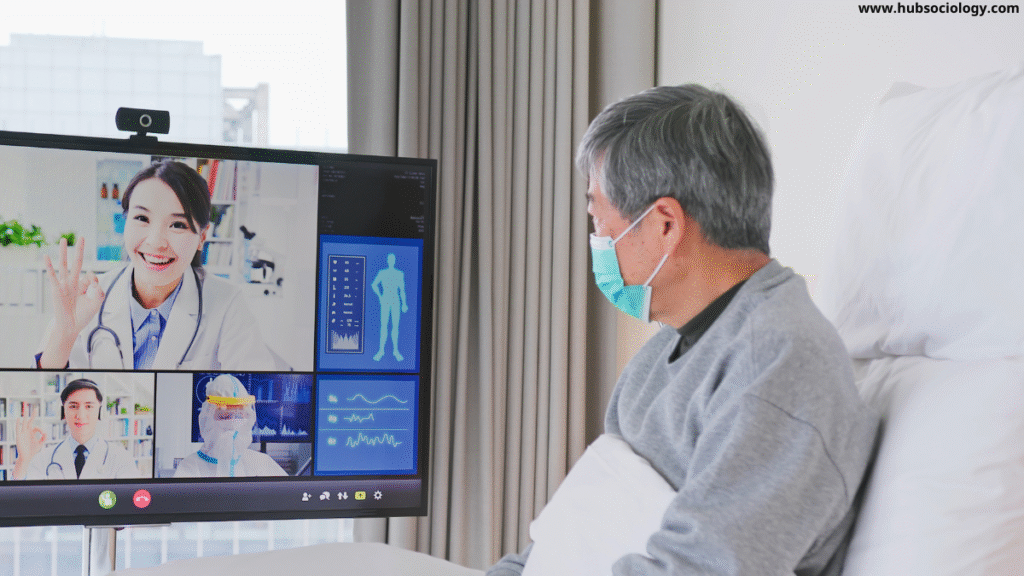Introduction on ICT and Health Care
The intersection of Information and Communication Technology (ICT) and health care is one of the most transformative developments in contemporary society. ICT has redefined the way health services are delivered, accessed, and perceived across the world. From electronic health records and telemedicine to mobile health applications and AI-driven diagnostics, the integration of ICT has altered the social dynamics of health care. In the sociological context, health care is not just about treating diseases; it is also about social relations, access, equity, cultural meanings, and power structures.
Therefore, examining ICT in health care from a sociological perspective provides insight into how technology mediates health, reshapes patient-doctor relationships, influences inequality, and contributes to the broader process of social change.

Table of Contents
ICT and the Changing Meaning of Health and Illness
Traditionally, health and illness were understood within localized, face-to-face settings where doctors, families, and communities played central roles. ICT has expanded the meaning of health by connecting individuals with global networks of knowledge and care. Online health platforms, fitness trackers, and digital monitoring devices allow people to conceptualize health as a continuous, data-driven process rather than merely the absence of disease.
From a sociological angle, this reflects a shift towards a “surveillance society,” where individuals are constantly encouraged to monitor, record, and optimize their bodies. This self-monitoring creates a culture of health consciousness, but it also produces pressure and anxiety, particularly when people compare themselves with digital health standards or online communities.
ICT and the Patient-Doctor Relationship
One of the most visible sociological impacts of ICT in health care is the transformation of the patient-doctor relationship. Traditionally, this relationship was based on face-to-face interaction, with doctors seen as authority figures. ICT has democratized medical knowledge by making health information available through the internet, social media, and health apps.

Patients are now more informed and sometimes challenge medical authority by seeking second opinions online. This democratization shifts the relationship from a hierarchical model to a more negotiated partnership. While this increases patient autonomy, it also generates challenges such as misinformation, over-reliance on non-professional sources, and the risk of undermining trust in medical expertise.
From a sociological lens, this reflects the changing power dynamics in health care, where authority is contested and shared in new ways.
ICT and Health care Inequality
Although ICT promises universal access to health knowledge and services, it also reproduces and sometimes widens existing social inequalities. This phenomenon is closely tied to the concept of the digital divide, where disparities in access to technology—based on income, gender, education, or geography—affect health outcomes.
For example, rural populations in developing countries often lack internet connectivity, making telemedicine inaccessible. Similarly, older generations may struggle with digital literacy, leaving them dependent on traditional health services. Women in patriarchal societies may face restricted access to mobile technology, thereby limiting their health information and autonomy.
Thus, ICT in health care is both an enabler and a divider, depending on how societies address these inequalities. Sociologically, this reveals how structural factors such as class, caste, and gender mediate technological benefits, showing that health care is not just a biological issue but also a deeply social one.
ICT and Public Health
From a sociological perspective, ICT has strengthened the collective dimension of health care by supporting public health surveillance, epidemic monitoring, and awareness campaigns. During the COVID-19 pandemic, ICT played a vital role in spreading information, tracking infections, and facilitating remote consultations. Mobile apps like India’s Aarogya Setu or global health dashboards highlighted how societies rely on digital tools for collective safety.
However, ICT-based surveillance also raises sociological questions about privacy, state control, and individual rights. For instance, health tracking apps may normalize government surveillance, blurring the boundaries between public safety and individual freedom. This duality reflects the sociological tension between collective health needs and personal autonomy.
ICT and Medical Institutions
Sociologists view institutions as structures that shape individual behavior and social life. ICT has significantly changed medical institutions, from hospitals to insurance systems. Electronic health records (EHRs), digital diagnostic tools, and hospital management software have improved efficiency, accountability, and data sharing.
However, the institutionalization of ICT also creates new hierarchies and forms of bureaucracy. For example, doctors and nurses often face administrative overload due to digital record-keeping. Additionally, private corporations controlling health data create concerns about corporate power and commodification of health. Health information becomes not just a social good but also a market commodity, reinforcing capitalist structures in health care.
Cultural Dimensions of ICT in Health Care
Culture plays a crucial role in shaping how ICT is accepted and used in health care. In some societies, telemedicine is embraced as a convenient alternative, while in others, physical consultation is seen as more trustworthy. Cultural beliefs about illness, gender roles, and privacy influence how communities interact with health technologies.
For example, in conservative societies, women may hesitate to use telemedicine due to privacy concerns or restrictions on communicating with male doctors online. Similarly, traditional healing practices often coexist or conflict with ICT-driven health services. These dynamics show that health care technologies cannot be understood in isolation; they must be studied in relation to cultural norms and values.
ICT, Globalization and Health Care
ICT has globalized health care by connecting local practices to international medical networks. Patients in developing countries can consult doctors abroad, access global health research, or order medicines online. Global platforms like the World Health Organization (WHO) also use ICT to spread awareness and coordinate responses to health crises.

From a sociological perspective, this reflects global interconnectedness but also highlights inequalities between the Global North and South. Wealthy countries dominate ICT-driven innovations, while poorer regions often remain dependent on them. Thus, globalization through ICT reinforces both cooperation and dependency, shaping the political economy of health care worldwide.
Ethical and Sociological Challenges on ICT and Health Care
The integration of ICT in health care raises several ethical and sociological concerns:
- Data Privacy and Ownership – Who controls patient data, and how is it used?
- Medical Misinformation – Social media spreads both knowledge and dangerous myths.
- Digital Exclusion – Vulnerable groups may be left behind.
- Dehumanization of Care – Over-reliance on technology may reduce empathy and human touch in medical practice.
- Commodification of Health – ICT creates new markets where health becomes a product, reinforcing capitalist inequalities.
These challenges show that ICT is not a neutral tool; it embodies power relations, cultural meanings, and ethical dilemmas that need sociological inquiry.
Conclusion on ICT and Health Care
ICT has become a vital force in shaping the structure, meaning, and experience of health care in contemporary societies. From empowering patients and enhancing public health surveillance to widening inequalities and raising ethical dilemmas, ICT is both a tool of progress and a site of social tension.
From a sociological perspective, health care through ICT is not just about technological advancement; it is about how societies negotiate power, culture, inequality, and collective well-being. Understanding ICT and health care sociologically enables us to move beyond a purely technical view and appreciate the deeper social forces at play.
As health systems worldwide continue to digitize, the sociological study of ICT and health care will remain essential in ensuring that technological progress aligns with social justice, equity, and human dignity.
Do you like this this Article ? You Can follow as on :-
Facebook – https://www.facebook.com/hubsociology
Whatsapp Channel – https://whatsapp.com/channel/0029Vb6D8vGKWEKpJpu5QP0O
Gmail – hubsociology@gmail.com
Topic Related Question on ICT and Health Care
5 Marks Questions on ICT and Health Care
- Define ICT in the context of health care.
- How has ICT transformed the patient-doctor relationship?
- What is the role of telemedicine in modern health care?
- Mention two ways ICT has improved public health.
- What is meant by the digital divide in health care?
10 Marks Questions on ICT and Health Care
- Discuss the sociological impact of ICT on health inequality.
- How does ICT contribute to the globalization of health care?
- Explain the role of ICT in public health surveillance with examples.
- Discuss how ICT affects cultural perceptions of health and illness.
- How does ICT influence the institutional structure of hospitals and medical systems?
15 Marks Questions on ICT and Health Care
- Critically analyze the ethical and sociological challenges of ICT in health care.
- How has ICT changed the meaning of health and illness in contemporary society?
- Discuss the role of ICT in balancing patient autonomy and medical authority.
- Examine ICT as both an enabler and reproducer of social inequality in health care.
- Evaluate the sociological implications of ICT-based health surveillance during pandemics.
